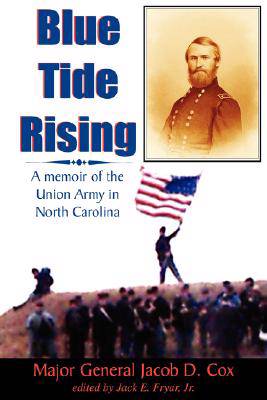
- Afhalen na 1 uur in een winkel met voorraad
- Gratis thuislevering in België vanaf € 30
- Ruim aanbod met 7 miljoen producten
- Afhalen na 1 uur in een winkel met voorraad
- Gratis thuislevering in België vanaf € 30
- Ruim aanbod met 7 miljoen producten
Zoeken
€ 19,45
+ 38 punten
Omschrijving
Major General Jacob Dolson Cox had plenty to do as a Union Army commander engaged in fighting along the Mississippi River, but when Ulysses S. Grant needed him and his men in North Carolina, he immediately headed east. By train and ship, Cox's command made an amazingly fast movement to the Cape Fear, where just weeks before Union and Confederate soldiers, sailors and marines had fought a desperate battle for Fort Fisher, guarding the last open port of the Confederacy at Wilmington. Now the fort was in Yankee hands, but Fort Anderson still remained upriver as one final obstacle to the fall of the port Robert E. Lee depended on. It fell to Jacob D. Cox and Adelbert Ames to eliminate Fort Anderson as they led the western element of a two-pronged assault on Wilmington. From there, Cox witnessed virtually every remaining battle in North Carolina during the Civil War. Goldsborough, Wise Forks, Kinston, Bentonville, Averasborough and Bennett Place - Cox either fought in or was close by every major clash of arms fought in North Carolina in 1865. Cox died before his memoir was published in 1900, but his account of his Civil War service made for an important addition to the story of the war, from someone who played a pivotal role in it. In this book, editor Jack E. Fryar, Jr. has excerpted from Cox's memoir the portions that deal with his extensive service in North Carolina in the closing months of the war. Cox tells about more than just the battles fought. He also tells of the men on both sides who made history in one of the most important dramas ever acted out in this country. With letters and personal insight into the issues and complexities of the war, Jacob Cox paints a vivid portrait of the struggles not just to win the fights, but to usher in the peace that would see the country whole again. This well illustrated volume will be a welcome addition to any student of the Civil War, and North Carolina's role in our nation's fiercest crucible by fire.
Specificaties
Betrokkenen
- Auteur(s):
- Uitgeverij:
Inhoud
- Aantal bladzijden:
- 148
- Taal:
- Engels
Eigenschappen
- Productcode (EAN):
- 9780978624835
- Verschijningsdatum:
- 9/07/2007
- Uitvoering:
- Paperback
- Formaat:
- Trade paperback (VS)
- Afmetingen:
- 152 mm x 229 mm
- Gewicht:
- 208 g

Alleen bij Standaard Boekhandel
+ 38 punten op je klantenkaart van Standaard Boekhandel
Beoordelingen
We publiceren alleen reviews die voldoen aan de voorwaarden voor reviews. Bekijk onze voorwaarden voor reviews.











